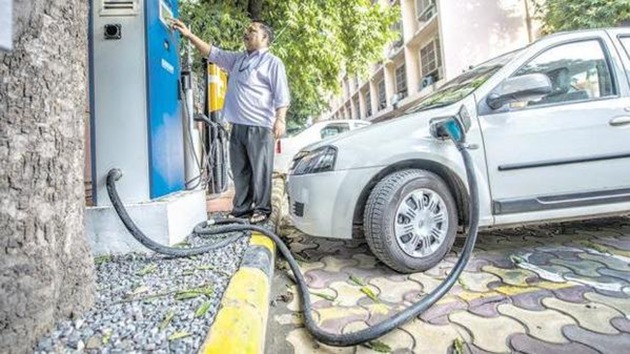NDA house divided on electric mobility plan
The latest case in point being transport minister Nitin Gadkari who is of the view that the government will not set a specific deadline for automakers to switch to EVs and nor will it ban production of petrol and diesel vehicles but instead let market forces decide on the preferred technology.
Even as the Union Budget, presented last month, provided an impetus to electric vehicles (EVs), there seems to be differing voices within the National Democratic Alliance (NDA)-led government on India’s ambitious plan for a transition to electric mobility.

The latest case in point being transport minister Nitin Gadkari who is of the view that the government will not set a specific deadline for automakers to switch to EVs and nor will it ban production of petrol and diesel vehicles but instead let market forces decide on the preferred technology.
In sharp contrast, government think tank National Institution for Transforming India (NITI) Aayog on 21 June asked the automobile industry to submit a plan on banning internal combustion engines (ICE)-fitted two-wheelers under 150 cc by 2025, and three wheelers by 2023, along with transition to electric mobility. Also, two- and three-wheeler makers in India may be asked by the government to pay up for vehicular pollution if they do not meet a deadline to start manufacturing EVs.
In an interview published in Mint, Finance Minister Nirmala Sitharaman said “Our current generation and future generation will be cursing us if we didn’t put our commitments up and forward. It is one thing for us to go and attend CoP 21 and come back and be able to…like we committed on solar energy and the International Solar Alliance...in the way in which we are investing in renewable energy. This is very consistent with that.”
While the government will continue to support electric vehicles and other new technology, Gadkari on Friday reiterated that while the Centre will not ban the ICE-fitted vehicles it will continue for focus on ways to curb pollution and reduce India’s dependency on oil imports.
“We need to give priority to alternative fuel that is economically sustainable and viable,” Gadkari said at the Mindmine Summit, adding that the government will allow all forms technology to continue and co-exist.
Gadkari said NITI Aayog has no authority to implement or take a call on shift to electric mobility, and that it was the transport ministry that will take a final call.
“There is some proposal in NITI Aayog. But I am the minister. NITI Aayog has no authority. I am always telling that we not going to ban (petrol, diesel vehicles), there is no time limit. We are not against petrol and diesel automobiles,” Gadkari said, adding that the government has been encouraging electric or battery-fitted vehicles and providing incentives to promote them.
“We are encouraging transport on alternative fuel, electric, bio-fuel, methanol, among others, but we are not going to ban petrol and diesel vehicles,” he said.
Interestingly, agreeing with Gadkari, NITI Aayog’s VK Saraswat, also present at the Mindmine Summit, said it was important to ensure that automobile industry is not hit by the ‘rapid disruption’, which was taking place due to the introduction of e-mobility.
“We should go through a transit mode where ICE (fitted automobiles) and e-mobility go together,” Saraswat said, adding that the transition to e-mobility should happen through hybrid route and the government should cut GST on hybrid cars dominated mainly by the luxury-car segment.
Gadkari’s comment will help allay fears of automakers, opposed to any such deadline, amid the worst slump in passenger vehicle sales in nearly two decades caused by a host of factors including higher ownership costs, liquidity crunch and farm distress. Discontinuing ICE-fitted vehicles will exacerbate the problems of the industry, automakers had said.
On Thursday, Mint reported that the Centre will give adequate time to automobile companies and will not impose any deadline to phase out internal ICE-fitted vehicles without stakeholder consultation.
The government has been trying to incentivise the adoption of EVs. As part of the government’s strategy, the Goods and Services Tax Council slashed tax rates on electric vehicles from 12% to 5% and from 18% to 5% on battery chargers from 1 August.
Also in the budget presented in July, Sitharaman announced several incentives for electric vehicles, including income-tax rebate for buyers and lower import duty on certain parts of electric vehicles. The Faster Adoption and Manufacturing of Hybrid and Electric Vehicles or FAME 2 scheme was also announced in March with an outlay of ₹10,000 crore.
Last week, Prime Minister Narendra Modi had said both ICE-fitted automobiles and EVs cab can co-exist, raising hope for some relief to automobile companies grappling with the crisis in the sector amid a slowdown in the economy.
Stay informed on Business News, TCS Q4 Results Live along with Gold Rates Today, India News and other related updates on Hindustan Times Website and APPs



